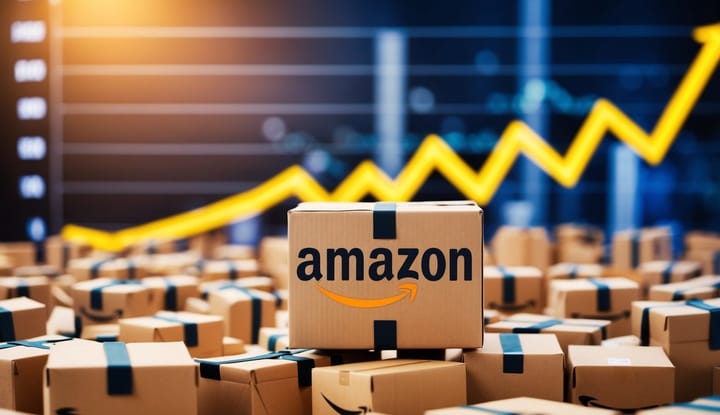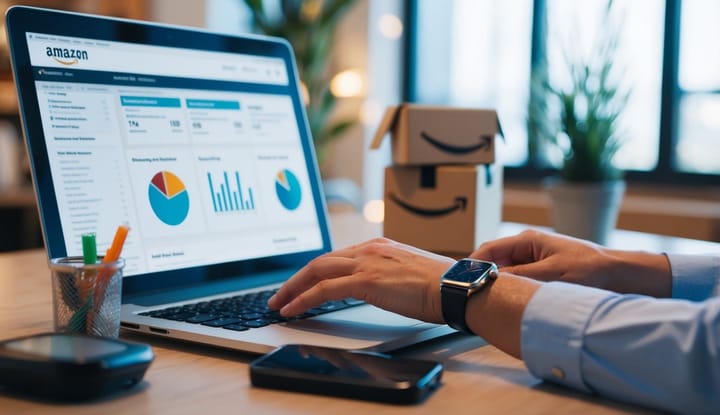Delegate Like a Pro: Hire an FBA VA and Dominate Sales

Running an Amazon FBA business takes a lot of work. Many sellers find themselves buried in daily tasks that take time away from growing their business. An Amazon FBA virtual assistant steps in to handle these important responsibilities.

A virtual assistant for Amazon FBA manages product listings, customer service, inventory tracking, and marketing tasks while working remotely to support the business owner. They take care of time-consuming work like answering customer questions, monitoring stock levels, and updating product information.
These remote assistants often have special training in Amazon's systems and best practices. They help business owners stay organized and keep operations running smoothly, which lets sellers focus on bigger goals like finding new products and planning business growth.
Key Takeaways
- Virtual assistants handle daily Amazon FBA tasks like customer service and inventory management
- Remote FBA assistants free up time for business owners to focus on growth strategies
- Trained virtual assistants help maintain smooth business operations and seller account performance
Core Responsibilities of an FBA Virtual Assistant
A virtual assistant takes on essential daily tasks to keep an Amazon FBA business running smoothly. They manage product listings, process orders, track inventory levels, and handle customer communications.
Product Listing Management
Virtual assistants create and optimize product listings to increase visibility and sales. They write clear product descriptions that highlight key features and benefits.
They research relevant keywords to improve search rankings and incorporate them naturally into titles and bullet points.
VAs upload high-quality product photos and ensure all image requirements are met. They keep pricing competitive by monitoring competitor listings.
They maintain accurate product details like dimensions, weight, and SKUs across all listings.
Order Processing and Fulfillment
Virtual assistants track orders from placement through delivery. They monitor shipping status and update order records in seller central.
They process refunds and returns according to Amazon's policies. VAs coordinate with fulfillment centers to resolve shipping issues.
They keep detailed records of all transactions and maintain organized documentation of order history.
Inventory Management and Updates
VAs track stock levels across warehouses to prevent stockouts. They create inventory forecasts based on sales trends and seasonal patterns.
They coordinate restocking orders with suppliers when inventory runs low. Virtual assistants update SKUs and product quantities in real-time.
They monitor storage fees and suggest inventory adjustments to optimize costs. They create regular reports on inventory performance and turnover rates.
Customer Service and Support
Virtual assistants respond promptly to customer questions through email and messaging. They handle product inquiries, shipping concerns, and return requests professionally.
They follow up on customer feedback and negative reviews to resolve issues. VAs document all customer interactions in the seller's support system.
They maintain response time metrics that meet Amazon's performance standards. They escalate complex problems to the business owner when needed.
Product Research and Sourcing
Product research and sourcing form the foundation of a successful Amazon FBA business. Virtual assistants analyze market data, research profitable products, and find reliable suppliers to help sellers make smart inventory decisions.
Keyword and Competitor Analysis
Virtual assistants conduct detailed keyword research to identify high-demand search terms. They use Amazon-specific tools to track search volume and competition levels for different products.
They examine competitor listings to spot gaps in the market. This includes analyzing prices, reviews, ratings, and sales rankings.
The VA creates detailed reports on top-performing competitors, including their pricing strategies and unique selling points. This data helps sellers position their products effectively.
Product Sourcing Methods
VAs search for products through multiple channels:
- Wholesale suppliers and manufacturers
- Online retail stores for arbitrage opportunities
- Trade shows and industry directories
- B2B marketplaces like Alibaba
They compare prices across different suppliers to find the best deals. VAs maintain spreadsheets of supplier contacts and pricing information.
Virtual assistants handle supplier communication and request product samples when needed. They track shipping costs and minimum order quantities.
Analyzing Market Trends
VAs monitor sales data to identify trending products in different categories. They track seasonal patterns and shifts in consumer demand.
They analyze sales velocity and Best Seller Rankings (BSR) to gauge product potential. Key metrics include:
- Monthly sales volume
- Price history
- Review velocity
- Category competition level
Virtual assistants create trend reports highlighting emerging opportunities. They alert sellers to changes in market conditions that could affect product performance.
Optimization and Digital Marketing Tasks

Virtual assistants handle crucial optimization tasks that boost product visibility and sales performance on Amazon. They manage advertising campaigns, improve product listings, and implement strategic keyword strategies.
SEO and Listing Optimization
A virtual assistant optimizes product titles, descriptions, and bullet points to match Amazon's best practices. They research top-performing competitor listings to identify effective optimization strategies.
The VA monitors listing performance metrics and makes data-driven adjustments to improve search rankings. This includes updating product features, benefits, and specifications to match current market trends.
They ensure all product information stays accurate and compliant with Amazon's guidelines. VAs regularly check for missing details or outdated information that could hurt visibility.
Amazon PPC Management
VAs track key PPC metrics like ACoS, CTR, and conversion rates. They adjust bids based on performance data to maximize ad spend efficiency.
They create and optimize sponsored product campaigns by:
- Setting up targeting for relevant keywords
- Monitoring competitor ad positions
- Identifying top-performing search terms
- Eliminating poor-performing keywords
Regular PPC reporting helps identify trends and opportunities for campaign improvements.
Content Creation for Listings
Virtual assistants write compelling product descriptions that highlight key features and benefits. They craft clear bullet points that address common customer questions and pain points.
They create enhanced brand content using:
- High-quality product images
- Informative infographics
- Brand story elements
- Comparison charts
VAs ensure all content follows Amazon's style guidelines and character limits.
Managing Backend Keywords
Virtual assistants research and implement relevant backend search terms. They analyze search volume data to prioritize the most valuable keywords.
They maintain organized keyword lists and update them based on:
- Seasonal trends
- Market changes
- New product features
- Customer search behavior
VAs remove redundant or irrelevant keywords to maximize the available character space for high-impact terms.
Account Management and Administrative Support
Amazon FBA virtual assistants handle critical backend operations to keep seller accounts running smoothly and efficiently. They manage essential administrative tasks while ensuring compliance with Amazon's policies and requirements.
Amazon Account Setup and Catalog Processing
A virtual assistant sets up new seller accounts by completing registration forms and submitting required documentation. They organize product catalogs and create detailed listings that follow Amazon's guidelines.
The assistant uploads product photos, writes compelling descriptions, and adds relevant keywords to improve visibility. They maintain accurate inventory counts and update prices based on market trends.
These specialists make sure all product information stays current and matches Amazon's format requirements. They track changes in Amazon's policies and adjust listings accordingly.
Data Entry and Analytics
Virtual assistants process sales data and maintain organized spreadsheets of inventory, orders, and customer information. They generate regular reports on key metrics like sales performance and profit margins.
They monitor competitor pricing and market trends to inform pricing strategies. The assistant tracks inventory levels and creates restocking alerts.
They compile data on customer reviews and feedback to identify areas for improvement. Regular analysis helps spot emerging sales patterns and seasonal trends.
Handling Trademarks and Product IDs
Virtual assistants submit trademark applications and monitor their status. They secure UPC codes and other required product identifiers for new listings.
These specialists keep detailed records of all product IDs, including ASINs, UPCs, and SKUs. They ensure proper trademark usage in product listings and marketing materials.
The assistant maintains documentation of intellectual property rights and brand registry information. They watch for potential trademark violations and report unauthorized sellers.
Expanding Business Operations with Amazon Virtual Assistants

Amazon virtual assistants help FBA sellers scale their operations through specialized skills and dedicated support. These professionals take on critical business tasks while keeping costs manageable.
Social Media and Email Marketing
Amazon VAs manage social media accounts across platforms like Facebook, Instagram, and Twitter to build brand awareness. They create engaging posts, respond to customer comments, and track social media metrics.
VAs design and execute email marketing campaigns to nurture customer relationships. They segment email lists, craft compelling newsletter content, and monitor open rates and click-through rates.
They schedule posts using tools like Hootsuite or Buffer to maintain consistent social presence. VAs analyze campaign performance data to optimize future marketing efforts.
Link Building and Online Reputation
Virtual assistants build quality backlinks through guest posting and directory submissions. They identify relevant websites and reach out to potential partners for collaboration opportunities.
They monitor brand mentions and online reviews across platforms. VAs respond professionally to customer feedback and work to resolve any negative experiences.
The VA team maintains accurate business listings on Google My Business, Yelp, and other platforms. They ensure consistent business information across all online channels.
Outsourcing and Cost Savings
Hiring virtual assistants reduces operational expenses compared to full-time employees. VAs typically work remotely, eliminating office space and equipment costs.
Businesses can scale VA support up or down based on seasonal demands. This flexibility helps optimize spending during peak and slow periods.
Many VAs charge hourly rates between $5-$15, making them cost-effective for handling routine tasks. Companies save on training costs since experienced VAs already understand Amazon's systems.
Hiring Amazon VA Services
Reputable VA agencies pre-screen candidates for Amazon selling experience and relevant skills. They match businesses with VAs who have expertise in specific areas like PPC or inventory management.
Look for VAs with strong English communication skills and positive client testimonials. Request sample work or trial periods to evaluate their capabilities.
Set clear expectations through detailed job descriptions and regular performance reviews. Establish communication protocols and reporting structures from the start.
Frequently Asked Questions

Amazon FBA virtual assistants take on many key tasks to help sellers grow their businesses. The role requires specific skills, training, and experience to succeed in this growing field.
Q: What are the primary responsibilities of an Amazon FBA virtual assistant?
Virtual assistants handle inventory management by tracking stock levels and reordering products when needed. They process customer orders and manage shipping logistics.
They create and optimize product listings with compelling descriptions and keywords. Many assistants also handle customer service by responding to questions and resolving issues.
Product research and market analysis help identify new opportunities. Virtual assistants often manage administrative tasks like email communications and report generation.
Q: How can one become a virtual assistant for Amazon FBA?
Starting as an Amazon FBA VA requires learning the Amazon seller platform and FBA processes. Taking online courses focused on Amazon selling basics builds essential knowledge.
Gaining experience through entry-level VA work or internships helps develop needed skills. Creating a portfolio of Amazon-related work samples demonstrates capabilities to potential clients.
Q: What skill set is required for an Amazon FBA virtual assistant?
Strong organizational and time management abilities are essential. Proficiency with Microsoft Office and basic data analysis tools is needed.
Communication skills matter for customer service and client interactions. Knowledge of SEO and product listing optimization helps drive sales.
Basic understanding of inventory management and supply chain concepts is valuable. Attention to detail ensures accurate product listings and order processing.
Q: What is the average salary of a virtual assistant working in Amazon FBA?
Entry-level Amazon VAs typically earn $3-5 per hour. Experienced assistants with specialized skills can make $15-25 per hour.
Pay rates vary based on location, expertise, and specific job duties. Full-time VAs often earn $1,500-3,000 per month.
Q: Are there specific courses recommended for training to be an Amazon FBA virtual assistant?
Amazon's Seller University provides free training on FBA basics. Udemy offers courses on Amazon VA skills and seller central operations.
Professional VA certification programs teach essential administrative skills. Specialized courses in product photography and listing optimization build valuable expertise.
Q: What entry-level opportunities exist for virtual assistants in Amazon FBA?
New VAs often start with basic data entry and product research tasks. Customer service roles provide good experience with the Amazon platform.
Working with small sellers allows learning different aspects of FBA. Part-time or project-based work helps build a track record of success.
Q: Why should I consider hiring an Amazon FBA VA?
Hiring an Amazon FBA VA can help you focus on the bigger picture of your Amazon business by taking care of time-consuming tasks like managing your product listings and running Amazon ad campaigns.
Q: What tasks can a virtual assistant for my Amazon store handle?
A virtual assistant can take care of various aspects of your business, including managing inventory, handling customer service, and optimizing your Amazon product listings to help grow your sales.
Q: How do I know if I need an Amazon virtual assistant?
If you're feeling overwhelmed with the daily operations of your Amazon store or if you want to take your business to the next level, it's a good sign that you need an Amazon virtual assistant.
Q: What should I look for when hiring an Amazon FBA virtual assistant?
Look for experienced Amazon VAs who understand the ins and outs of managing an Amazon FBA account, including product research, listing optimization, and running effective advertising campaigns.
Q: Can a virtual assistant really help me reduce costs in my Amazon business?
Absolutely! A virtual assistant can save you money by streamlining processes, allowing you to focus on growth strategies, and potentially reducing the need for additional full-time staff.
Q: How do I find the right virtual assistant for my Amazon store?
Start by checking out virtual assistant services that specialize in Amazon-related tasks. Look for reviews, test their knowledge of the Amazon seller central platform, and see if their skills align with your business needs.
Q: What are the benefits of hiring an Amazon virtual assistant?
The benefits include freeing up your time, increasing productivity, and getting expert help in managing your Amazon product listings and running ad campaigns, which can significantly boost your sales.
Q: What can I expect from a virtual assistant's services?
You can expect a range of services tailored to your needs, such as product research, customer support, order management, and even social media marketing, all to help grow your business.
Q: Is it worth investing in a virtual assistant for my Amazon business?
Yes! Investing in a virtual assistant can lead to a more efficient operation, allowing you to focus on scaling your business while they handle the day-to-day tasks.
Ready to Stop Drowning in Amazon Tasks?
Join our mini-course at WAH Academy and learn how to hire and train a skilled virtual assistant—so you can focus on growing your business instead of doing everything yourself.
No burnout. No busywork. Just smart support to help you scale faster.
Tap the button and start building your Amazon dream team today.



